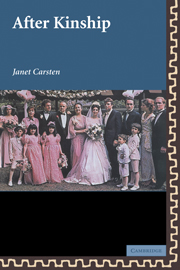Book contents
- Frontmatter
- Contents
- Acknowledgments
- 1 Introduction: After Kinship?
- 2 Houses of Memory and Kinship
- 3 Gender, Bodies, and Kinship
- 4 The Person
- 5 Uses and Abuses of Substance
- 6 Families into Nation : The Power of Metaphor and the Transformation of Kinship
- 7 Assisted Reproduction
- 8 Conclusion
- Bibliography
- Index
1 - Introduction: After Kinship?
Published online by Cambridge University Press: 05 June 2012
- Frontmatter
- Contents
- Acknowledgments
- 1 Introduction: After Kinship?
- 2 Houses of Memory and Kinship
- 3 Gender, Bodies, and Kinship
- 4 The Person
- 5 Uses and Abuses of Substance
- 6 Families into Nation : The Power of Metaphor and the Transformation of Kinship
- 7 Assisted Reproduction
- 8 Conclusion
- Bibliography
- Index
Summary
Nineteen-ninety-five, Nottinghamshire, England. Stephen Blood, critically ill with bacterial meningitis, lies in a coma on life support machines. His sperm are removed without his prior written consent. Within a few days he is dead. Although he and his wife, Diane Blood, had been trying to conceive a child before his death, the British Human Fertilisation and Embryology Authority (HFEA) refuses to grant permission for Diane Blood to undergo artificial insemination using her husband's sperm. Diane Blood challenges the decision in the High Court. In October 1996 the challenge is dismissed on the same grounds as the original HFEA ruling.
Diane Blood announces her intention to take the ruling to the Court of Appeal: “I think that I have the most right of anybody to my husband's sperm and I desperately wanted his baby” (The Guardian 18.10.96). Sir Stephen Brown, president of the High Court's Family Division, comments sympathetically, “My heart goes out to this applicant who wishes to preserve an essential part of her late beloved husband. The refusal to permit her so to do is for her in the nature of a double bereavement. It stirs the emotions and evokes what I believe to be universal sympathy for the applicant.” “Leading fertility expert” Lord Winston describes the decision of the High Court as “cruel and unnatural.” Baroness Warnock, chair of the Parliamentary Committee that led to the setting up of the HFEA, reportedly blames herself: “We didn't think of the kind of contingency which has actually arisen” (The Guardian 18.10.96).
- Type
- Chapter
- Information
- After Kinship , pp. 1 - 30Publisher: Cambridge University PressPrint publication year: 2003



